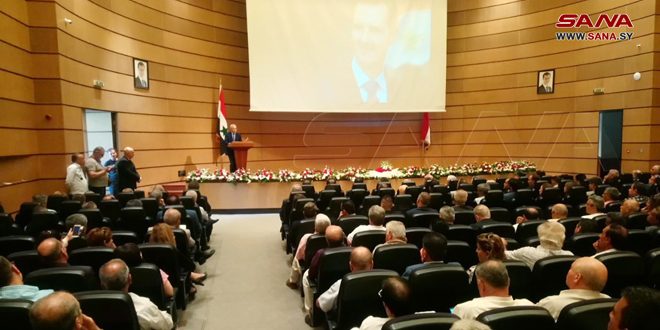“Expatriates Forum” at Damascus University highlights investment opportunities in Damascus Countryside
Activities of the “Expatriates Forum” kicked off this morning at Damascus University with the aim of briefing the Syrian expatriates on the investment opportunities available in the governorate of Damascus Countryside and reviewing the situation of services, agriculture, health, environment and investment in this governorate.
In the opening ceremony, the Minister of State for Southern Region Development, Diala Barakat, asserted the need to activate the role of expatriates in economic, social, scientific and cultural development, indicating that Syrians abroad were and still are the bridge of communication between the homeland and the countries of the world and contributed to spreading the real image of what is happening in their homeland to refute the fierce media war that launched against him.
She added that the expatriates contributed to breaking the political and economic siege on their country, and that the presence of Syrians abroad is a source of richness for Syria, its civilization and culture, referring to the government’s efforts to strengthen the relationship of the people of the country with each other and maintain the continuity of this relationship between generations.
For his part, the head of the Syrian Investment Authority, Madian Diab, spoke about the investment opportunities in Syria, which constitute an important attraction factor for foreign investments, and that the new investment law No. “18” is a qualitative leap for developing the investment environment and addressing all the gaps and obstacles facing investors.
Asaad Khalouf, Director of Industrial and Craft Zones in Damascus Countryside, indicated that four new industrial zones have been established in Deir Attia, Harran Al-Awamid, Ashrafieh Sahnaya and Khirbet Al-Shaiban, and work is being done to prepare the infrastructure in them with the aim of attracting investors and businessmen.
The expatriates demanded the necessity of facilitating the procedures for obtaining licenses for investment projects, providing electricity to factories at reduced prices, facilitating the import of production materials and requirements, and developing services provided to the investment to be attractive to investors for establishing projects that fall into the reconstruction process.
They also underscored the need to strengthen communication tools with Syrians abroad and to launch foreign investment promotion campaigns in cooperation with Syrian embassies.
Basma Qaddour & Hamda Mustafa

